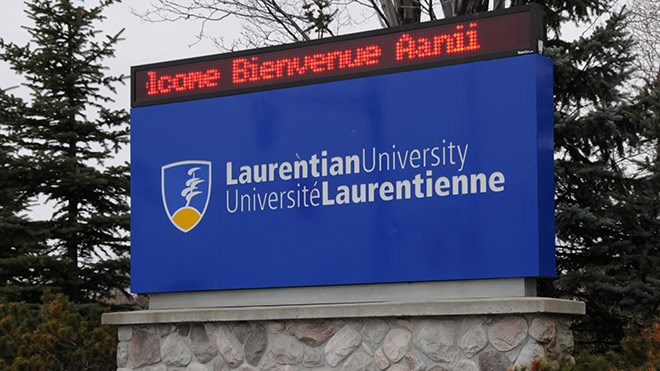“We have plans to do so, but currently our graduate space allocation does not allow us to fulfil our role to the extent we could or should.”
Although Laurentian didn't get everything it asked for, the university is still pleased with the news, said Laurentian vice-president of administration Carol McAulay.
“This gets us a long way there,” she said.
“We thought the discussions with the government about our aspirations and graduate education were very positive. We're pleased about the graduate allocation.”
The university needs these additional graduate students to drive research, McAulay said.
Not every university received the same kind of graduate space boost that Laurentian did — York University, for example, didn't receive any new spots at all.
The province recognizes “Laurentian intends to have a higher focus on graduate education,” McAulay said.
The boost in graduate spaces was just one aspect of Laurentian's strategic mandate agreement with the province.
These three-year agreements, hammered out between the Ontario government and each of its 44 colleges and universities, were made public next week.
They force each institution to put into writing which 10 programs they consider their strongest, and which five they hope to expand.
In so doing, the province is attempting to reduce duplication and create more specialization at a time when post-secondary funding will rise just one per cent per year over the next three years.
It's a move towards a system similar to those in Alberta and British Columbia, where schools are expected to specialize and not be all things to all students.
Laurentian's strategic mandate agreement bears a lot of similarity to its 2012-2017 strategic plan.
“Government referred to our strategic mandate agreement as one of the strongest in the province right from the get-go, and I think part of that was we'd done all the planning,” McAulay said.
The five program areas Laurentian hopes to expand are architecture, engineering and earth sciences, French language programs, forensic science, criminal investigative science and IT and northern health and development and indigenous relations.
“I'm glad the negotiation is done,” McAulay said. “It allows us to continue doing what we were doing under our strategic plan and continue to grow in the areas we really feel that we're unique.”
Sonia Del Missier, Cambrian's vice-president academic, said the college was put in an interesting position in negotiating its strategic mandate agreement.
The college's new president, Bill Best, just arrived on campus earlier this month, and he'll be leading Cambrian through a strategic planning process.
Del Missier, the college's interim president over the past year, said the province recognized this, and said there might be an opportunity to amend the agreement.
The program areas Cambrian hopes to expand are in the trades and health care — areas where Del Missier said there's a lot of demand.
These include apprenticeships in gas technician, refrigeration and air conditioning systems mechanics, automotive service technician, environmental mining, power engineering and health and community services.
Del Missier said the planning exercise was a positive one for Cambrian, as it gave the school a chance to look at its priorities. She said she thinks strategic mandate agreements are a good thing for the province as a whole, too.
“I think it was an opportunity to look at how we could ensure that the post-secondary education system is relevant, and that it's sustainable, because the reality is, there are only so many dollars,” said Del Missier.
Collège Boréal's strategic mandate agreement is a little different than most, said Danielle Talbot-Lariviere, the college's vice-president of workforce and business development.
That's because it's the only French-language college in the communities it serves, so it must provide a wide variety of programs.
For its proposed program areas of specialization, Boréal listed administration, health, community services, technology and skilled trades, covering all of the subject areas community colleges teach.
“We couldn't say we were going to specialize in health sciences and let go of the trades,” Talbot-Lariviere said.
“I don't think we'd meet the needs of industry or help out our students, because we're not giving them access to French-language programs in the areas they want. So for us to just say 'This is where we're focusing,' I think we would be doing a disservice.”
Join Sudbury.com+
- Messages
- Post a Listing
- Your Listings
- Your Profile
- Your Subscriptions
- Your Likes
- Your Business
- Support Local News
- Payment History
Sudbury.com+ members
Already a +member?
Not a +member?
Sign up for a Sudbury.com+ account for instant access to upcoming contests, local offers, auctions and so much more.
